Director Iain Softley on the Hackers soundtrack and music in film
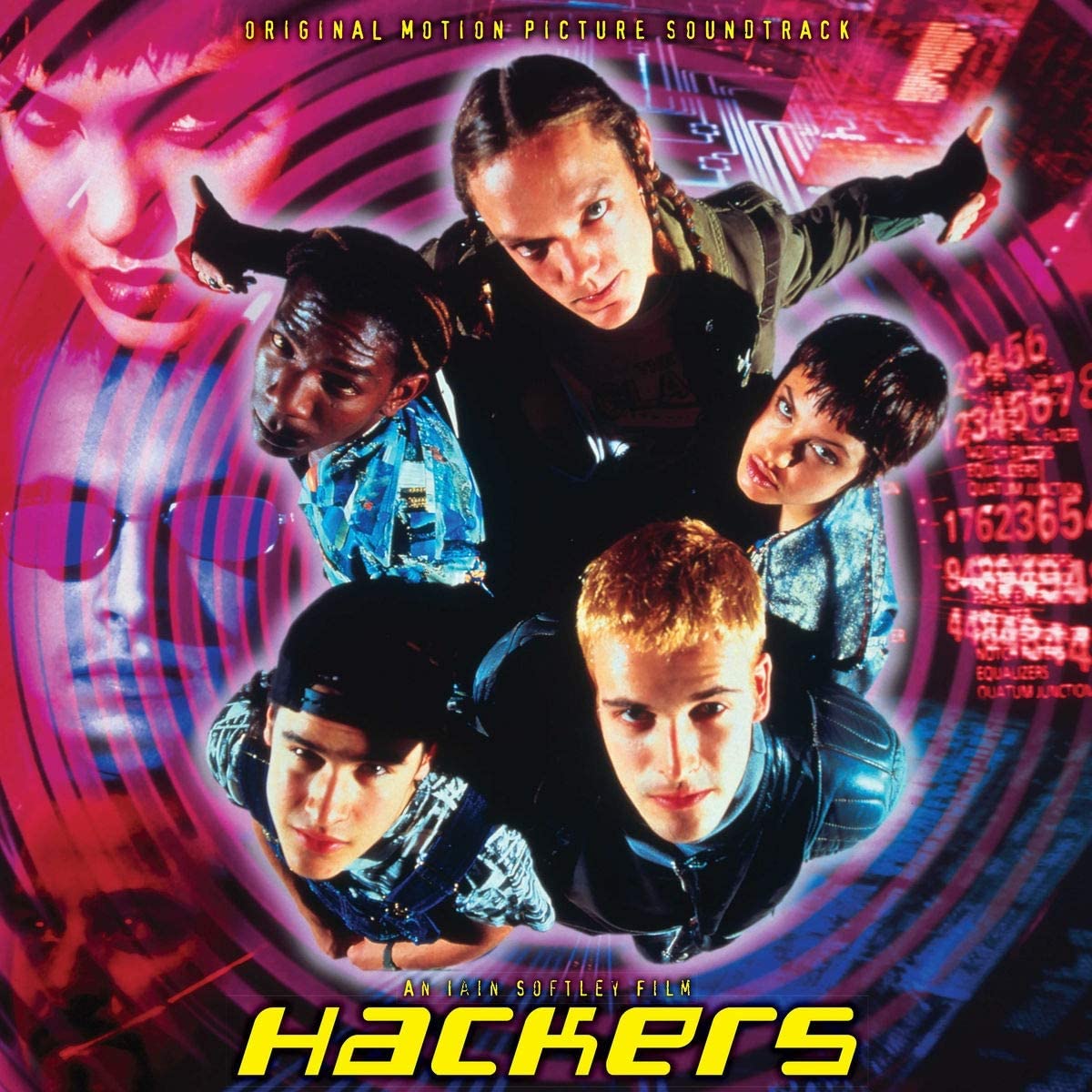
“With Hackers we were saying the internet is the new rock ’n’ roll”
Film director Iain Softley talks to SDE about the music in his 1995 film Hackers which is now finally available in a new expanded 2LP vinyl and 2CD set.
SuperDeluxeEdition: The Hackers soundtrack album has never been available on vinyl before, has it?
Iain Softley: It’s really a different album and soundtrack release, in a number of ways, from the release we had when the film came out. It’s got all of the tracks that we wanted on the soundtrack that we weren’t able to have on the first soundtrack, most notably the track ‘Grand Central’ which is one of the most important tracks in the film – written and performed by Guy Pratt, with David Gilmour. It’s the first time we’ve been able to credit David Gilmour’s involvement in the recording.
SDE: What were the issues originally with that track?
Iain: I’m not sure, to be honest. It might have been because David’s involvement was informal. What happened was, I met Guy Pratt during the making of the film – actually during the preparation for the film, because Guy’s girlfriend at the time, who later became his wife – Gala Wright – was working with me on Hackers. She was originally my assistant, but eventually became the music coordinator and a sort of general creative consultant. So Guy was very aware of the way I was thinking, musically, and with Gala’s help and the help of Bob Last – who was the musical supervisor on Backbeat, my previous film – I went in this cyberpunk-type direction and the mixture of the ambient/trance music of the time was very appropriate to the concept I had for the film, which was that it was an altered state that the lead characters get into when they were hacking and they are in this kind of virtual, imagined, fantasy world. And that idea of being transported, is very much the experience of listening to that music. So, Guy was aware of all this and he knew I had issues getting rights to one of the tracks that I had ‘temped’ into the score [the practise of inserting music temporarily for editing purposes] and he claims that he kind of tempted me by saying I can play and write something and I can always get Dave Gilmour as well! But actually, the track was great and Gilmour was a big bonus.
SDE: It’s impossible to not recognise David Gilmour’s style of guitar playing, though, isn’t it?
Iain: [laughs] Yeah! Incidentally… I was at a birthday party that Gala had – she stopped working for me a while back, but we are still friends – and I was there with David and he said “when’s the Hackers soundtrack coming out?”, so it’s obviously got his tacit approval!
But the other thing about the release around the time that the film came out, and the reason why this is such an important release – in many ways, I consider it to be the definitive soundtrack release, as opposed to a re-release – is because we couldn’t get a soundtrack deal for the American release of Hackers. I was just coming off the back of Backbeat, which in the music and film world was a successful film. It had a lot of supporters and followers and it was partly because the music in Backbeat – which was about The Beatles in Hamburg – got the stamp of approval from a lot of people, like Joe Strummer, Don Was and Dave Grohl, who ended up playing on the soundtrack.
Anyway, Don Was put together this grunge supergroup of Grohl, Mike Mills, Thurston Moore, Greg Dulli, Henry Rollins… and the record companies were expecting something similar for Hackers, which on the surface was not an unreasonable thing to expect, because at the time everybody saw hackers as a kind of indie, grungy group of people, anyway. But I intentionally created this club-culture vibe, which was more futuristic and the music for that was not grunge or indie guitar music, so they were completely caught out. So, we didn’t get a deal. They said nobody in America listens to techno, so this is just going to go over everybody’s head.
The film came out about six months later in the England and other territories and this music already had a huge following in the UK and we managed to get the soundtrack out, but we were on a time limit, so the tracks that ended up on it the first album issued by Edel Records didn’t include the Guy Pratt/David Gilmour tracks, it didn’t have Leftfield with John Lydon (‘Open Up’), and it didn’t have Massive Attack either. Those are key tracks in the film, which we are now thrilled to have. The other thing was, because it wasn’t a major record company release, we didn’t have [access to] the art and couldn’t offer the proper double gatefold vinyl experience that we were able to put together for this release. Everybody involved with the film is very, very excited about this [new release].
SDE: Did the record label approach you with the idea of reissuing the soundtrack?
Iain: I was aware there was something happening… really it goes back to the 20th anniversary, when a blu-ray was released in the UK and America and I did a commentary for the film with critic Mark Kermode. He was one of the earliest and most vocal champions of Hackers when it first came out, and he’s actually written some fantastic sleeve notes for this vinyl reissue. In 2015, it ended up showing in London on the big screen and 13 cities in the States and it kept coming up – “why isn’t there a soundtrack album?” I knew the music was important, but I’d forgotten how all-immersive it is in the film. It really drives it. So, I had a conversation with Bob [Last] in terms of what route we might take to get the rights and to approach the bands – particularly people like Leftfield and Massive Attack, who we hadn’t managed to get in the first instance. And Concord Music and Varese [Sarabande] seemed the logical place, since two of my friends work at Concord – who are the parent company and own Varese – and they were enthusiastic and we took it from there.
SDE: Were you into this kind of music at the time anyway, or were you learning about it yourself?
Iain: I think it was a combination. When we were doing Backbeat, I was getting more and more immersed in the music world and was getting invited to things… and there’s something incredibly enduring about house music of that time and I don’t think the soundtrack has dated at all.
SDE: When you are working on a film, what factors determine whether the soundtrack is going to be song-based, or have a score? With Hackers, it was a mixture of both, wasn’t it? Taking Massive Attack’s ‘Protection’ as an example, that had already been a hit in the UK singles chart. Are you balancing commercial and promotional considerations with what serves the story and the film?
Iain: It absolutely starts with the story and the film. And you’ve already referred to the fact that with Hackers the lines are blurred between the tracks and the score and that was very intentional. And I’ve actually done that in a number of my subsequent films, because one of the things that drew me to cinema was the way music and image work together. I love the way you are transported by music in cinema. I sometimes think that, other than live music, it’s the best way to listen to music, so for me it’s a hugely important element and one of the reasons why I enjoy films and why I put it in my films and I want it to be part of the narrative, in a way. In Hackers, I guess the track that most straddles song and score is ‘Halcyon and On and On’ by Orbital. Even though that was a released track, I reused that as a piece of score and it determined the rhythm of the transition from Johnny Lee Miller looking down at the grid of New York skyscrapers which in his mind then turns into the computer circuit board. And I can’t imagine that without ‘Halcyon and On and On’ – it’s so intrinsic, you can’t separate them. And Simon Boswell, who wrote the score, talks about how it informed him, in terms of the direction the score should go and the musical palette that was being used.
SDE: When you are filming, there is, presumably, no music. So, do you have to do anything with the actors to let them know about the pace and the energy of a scene?
Iain: Yeah… well I often do play music. If it’s the track, then we might play that or sometimes I will get the composer to create some samples. But I’ve always done that. I always like playing music. Not everybody on the set likes it, but the cast love it – it’s great for them.
SDE: Do you have to ask for special permission if you want to do something that changes a track, such as edit it or removing vocals? How much latitude do you get given by the artist and/or record company?
Iain: I think once you buy the track, you can pretty much do anything with it. And I’ve actually got permission from some bands, with huge tracks to remix them… but it doesn’t always work out, there’s always some person who objects. Often people who wrote the song – the band – are all for it and I think something like that gives the song, the composition another lease of life.
SDE: The weird thing about the Hackers soundtrack originally was that it spawned some ‘sequels’, totally separate from the film and took on a bit of a life of its own. Slightly bizarre.
Iain: [laughs] It was very bizarre. And apparently, a lot of people think there is a ‘Hackers 2’ hiding out there, somewhere!
SDE: This was an interesting period, though, wasn’t it? Because a lot of soundtracks (or ‘inspired by’ compilations) came off of Danny Boyle’s Trainspotting. That mid-nineties period there was a lot going on, in terms of the culture… music and film coming together.
Iain: Absolutely, but I think what frustrated us was that story that I told you…we were slightly too earlier for record companies to clock on to it. We’d finished our film about a year before Trainspotting came out. And Simon Boswell, who did the score for Hackers, also did the score for Shallow Grave – and Trainspotting. Anyway, he told me – and I didn’t realise this [at the time] – but he told me that Danny Boyle asked if he could come in, under the radar, into the cutting room and watch some sections of Hackers, because he was considering casting Johnny Lee Miller. So, it was based on him seeing Johnny in Hackers that he cast him. Obviously, Trainspotting was hugely successful and a great film, and I think it generated its own momentum, music-wise, but the music was better known at that point but with Hackers [that wasn’t quite the case].
SDE: How much did the absence of a soundtrack in the American marketplace hurt you, in terms of what that can bring when it comes to promotion?
Iain: Well that’s not an area I have any figures for, but certainly my perception was that at the time, it was a hugely important part of it… there were a lot more record stores around… the Virgin Megastores… they were everywhere. And if you could get a [window] display, particularly, of the soundtrack coming out it was just another very big outlet for publicity, on top of the publicity you’d get from the reviewing of the album. So, it was a great disappointment, especially since we knew that the soundtrack was a big selling point and a big element of the film.
SDE: How do you look back on the film, because it’s very interesting since it was the beginnings of the internet.
Iain: There’s a double take on it, really. I mean, I never set out to make a technological film. I set out to make a film about counter-culture. You know, coming off the back of Backbeat, I thought ‘what is the new rock n’ roll going to be?’ What’s the place that young people will go into to escape their schools, their home life, their parents, the neighbourhood they’re in… it wasn’t that difficult to anticipate that this was going to explode, because we were working with people who were already [doing it]… you know people in clubs, internet developers telling us about the future with 3D, and images and worlds that you could disappear off into. It wasn’t there when we made the film. When we made the film, it was black and white text on a screen…
SDE: Well, I was going to say that you did a very good job of visualising what didn’t exist at that time.
Iain: Yeah… well in a sense we were visualising a technological trip, the altered state, the imagination of the characters… where that was taking them. What they were seeing when they were inside these technological worlds. So, I think from that point of view… everyone who worked on the costumes, the design, the graphics – Neville Brody who was working on The Face [magazine] at the time, he did all the graphics – we were all really happy that we were representing what was about to happen. And I think that people recognise that now. Obviously, with the technology [things have moved on]. It’s like when you see someone with a ‘brick’ phone in a 1980s film… but interestingly it’s a film that’s very, very popular with geeks. They forgive it all the technological anachronisms and they’re just happy that someone saw them as cool. But I think the thing that has grown over time is that it’s seen as representing counter-culture, you know… representing music, fashion, clubs, that way of life and not many films linked that to computers and the online, internet world. We were basically saying the internet is the new rock ’n’ roll. It’s the new psychedelia – and I think that holds up. Another thing I’m quite surprised about – because all the actors were very young and it was kind of everybody’s first film – was the commitment they brought to their performances. Because it is, in a way, a sort of fun caper. It was always supposed to be fun and not take itself too seriously. But in order for those things to work, you’ve got to have those actors believing they are those characters. And the authenticity they brought to those roles gives it an emotional conclusion that I’d sort of forgotten.
SDE: Just finally, I can see your CDs in the background [the interview was conducted over Zoom]. Do you still buy physical music?
Iain: I do it all. I stream… I don’t download much anymore, but I like the physicality of an album, so I’ll go to Rough Trade and buy something and I really like buying vintage vinyl, especially if you can get stuff cheap. I’m plugging the gaps in my collection where things have gone missing due to moving house or you’ve lent stuff to people over the years and never got it back . If there’s something I really love I’ll always buy it on vinyl, but with CDs, one of the place I love listening to music is on a long car journey, and there’s this evangelism about the digital world that wants us all to believe that the whole of the country is wired up with fast broadband. But I can tell you if you drive not much north of the M25 to the Norfolk coast, you can’t listen to Spotify and you can’t even listen to digital radio. You’ve got to listen to CDs. So, I always have CDs in the car.
SDE: It’s a travesty, because most cars don’t have CD players anymore so it’s hastening the decline of the format.
Iain: It is and it’s ridiculous… there’s a 50-mile bit on the M11 where you cannot listen to Spotify – unless you’ve downloaded – and you cannot listen to digital radio, so what are they playing at! [laughs].
Thanks to Iain Softley who was talking to Paul Sinclair for SDE
The double vinyl edition of Hackers was issued last weekend as an RSD ‘drop day 2’ special. Check out your local store for availability. Townsend Music still appear to have availability online. The two-CD set is widely available and offers additional cues from Simon Boswell’s score.
Compare prices and pre-order

Various Artists
Hackers 2CD edition

|
|
||||||||||||||||||||||||||||||||||||||||||||||||||||||||||||
![]()
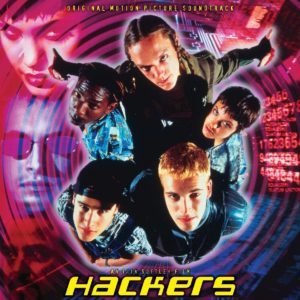
Hackers 25th anniversary RSD 2LP vinyl
Side A:
1. Halcyon Performed – Orbital
2. Hackers Suite Performed – Simon Boswell
3. Open Up Performed – Leftfield
Side B:
1. Cowgirl Performed – Underworld
2. Voodoo People Performed – Prodigy
3. Connected Performed – Stereo MC’s
Side C:
1. Original Bedroom Rockers Performed – Kruder & Dorfmeister
2. One Love Performed – The Prodigy
3. Good Grief Performed – Urban Dance Squad
Side D:
1. Protection – Massive Attack
2. One Combination Performed – Guy Pratt
3. Grand Central Station Performed – Guy Pratt, featuring David Gilmore
4. Heaven Knows Performed – Squeeze

Hackers 25th anniversary 2CD set
CD1
1 Orbital Halcyon On and On 9:29
2 Leftfield Open Up 6:52
3 Underworld Cowgirl 8:55
4 Prodigy Voodoo People 4:05
5 Stereo MC’s Connected 4:00
6 Prodigy One Love 3:52
7 Kruder & Dorfmeister Original Bedroom Rockers 6:06
8 Urban Dance Squad Good Grief 4:29
9 Squeeze Heaven Knows 4:35
CD 2
1 Massive Attack Protection 7:45
2 Guy Pratt One Combination 1:50
3 Guy Pratt Grand Central Station Featuring – David Gilmour
4 Simon Boswell Hackers Suite 6:13
5 Simon Boswell Diskette 2:04
6 Simon Boswell City of Data 4:06
7 Simon Boswell Ellingson HQ 2:35
8 Simon Boswell Cereal’s Speech 3:00
9 Simon Boswell Kernel 2:16
10 Simon Boswell Date Night 4:14

 Interview
Interview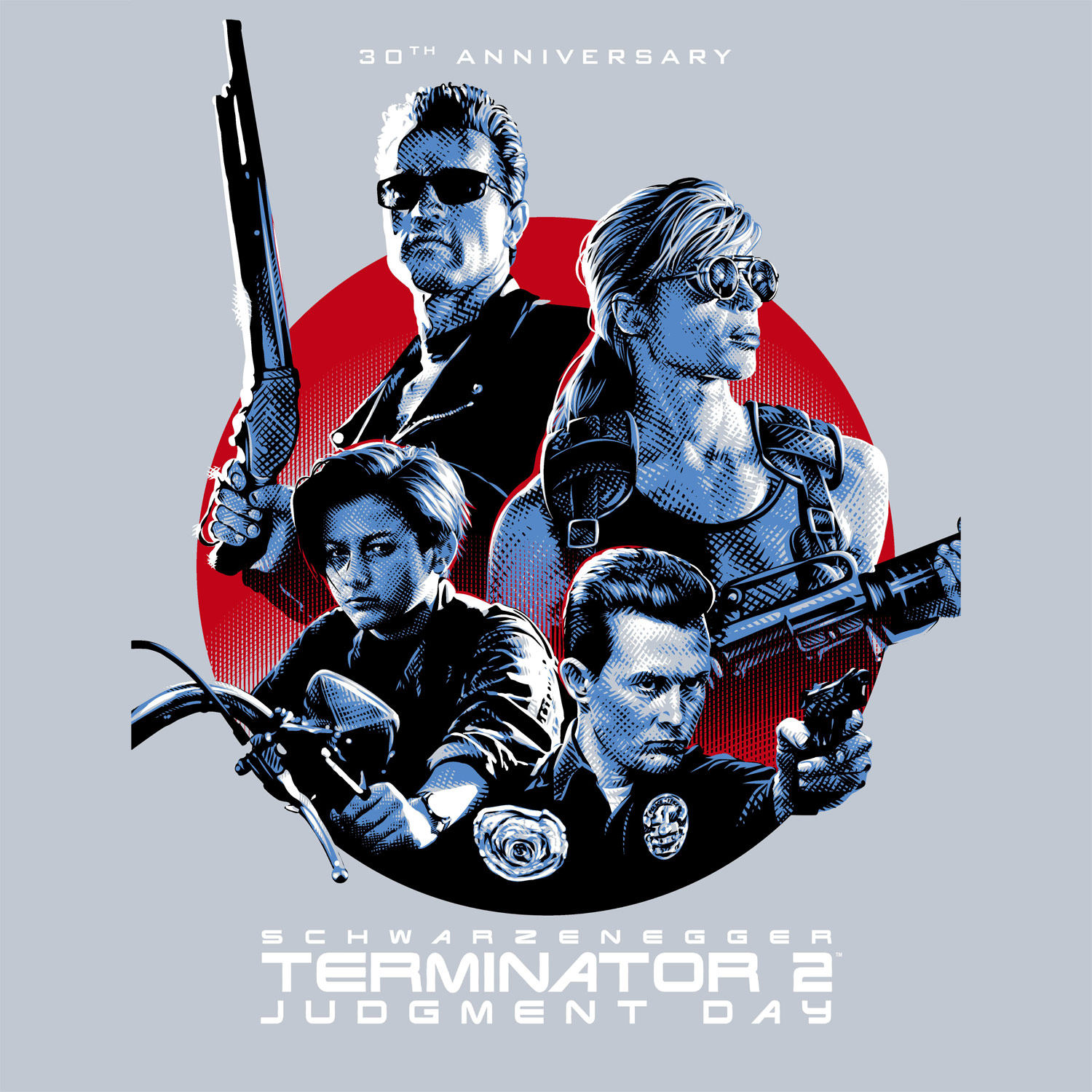
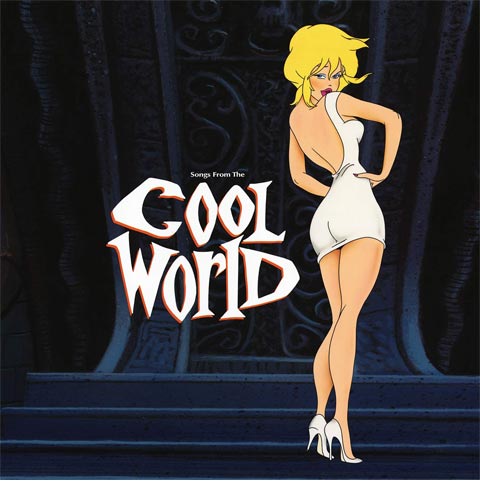
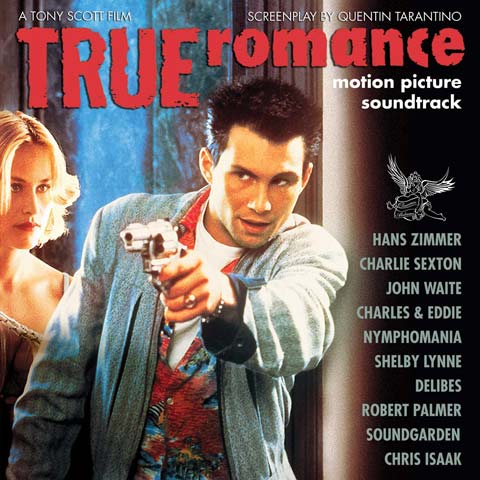
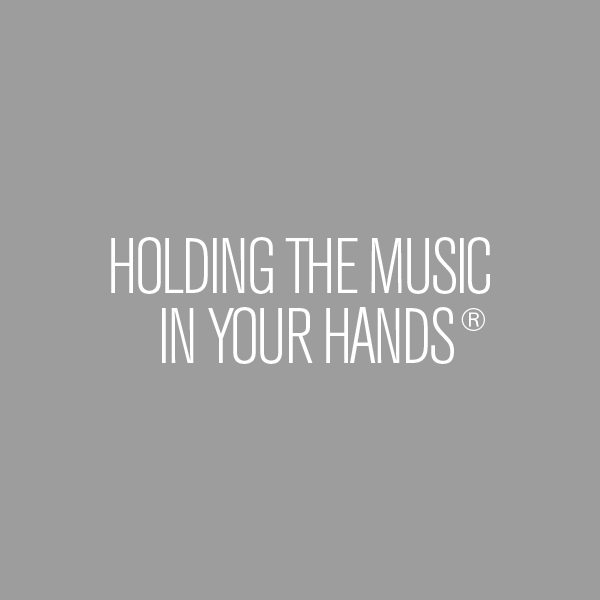
Having the original CD album, I noticed that 5 tracks were omitted from this new deluxe release. Why were these songs not included?
Interesting interview Paul. David Gilmour needs correcting on the vinyl credit on Side D (Gilmore).
Regards,
Thanks. Yeah, I noticed they’d spelt his name wrong…
Yeah I had no luck finding the Hackers soundtrack in the 4 record stores I went to. ;-(
The reason some people think there’s a ‘Hackers 2’ floating out there is possibly because, like ‘Trainspotting’, ‘Hackers’ had a second soundtrack: https://www.discogs.com/master/view/188409
It’s confusing, but I guess they wanted to milk the cash cow given the popularity of the first installment.
Indeed…
I was able to get a copy of this on RSD. Love the film and the soundtrack is just amazing, Open Up (leftfield) is so good but Cowgirl by Underworld is the best.
Good to see a Squeeze song in there..! If anyone needs vinyl re-releases (in coloured vinyl naturally) it’s Squeeze.
Good interview. Being a film fan, I too always love it when film and soundtrack blend together well.
Michael Mann is another director that does this brilliantly often using songs for key scenes in his films (such as Brian Eno or Moby in ‘Heat’). I agree that the soundtrack does indeed serve as a promotional tool for a film. I’ve often been drawn to films purely by their soundtracks and equally annoyed when an official soundtrack doesn’t exist or misses out key tracks.
‘Hackers’ however is one of those 90s films that do I remember seeing back in the day but had forgotten about, but after reading this feel inspired to revisit, and its soundtrack. Love these tracks from Orbital and Massive Attack… I do miss the 90s
Thanks for this piece Paul! Being a 90’s child, this film brings back huge memories and if it’s on TV I never miss it.
I remember when this movie came out, I’d not seen it, but while record shopping in Tower Records, hearing people coming into the shop repeatedly asking about the soundtrack to this film which at the time did not exist. This could have/should have been the ground zero introductory soundtrack compilation for the “electronica” crowd in the States when this was first made. A missed opportunity.